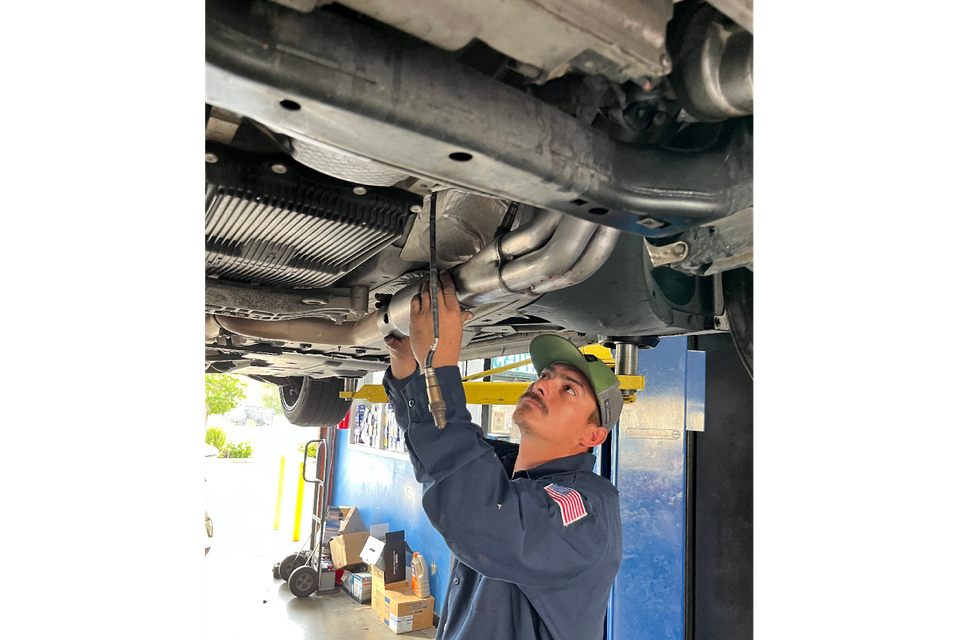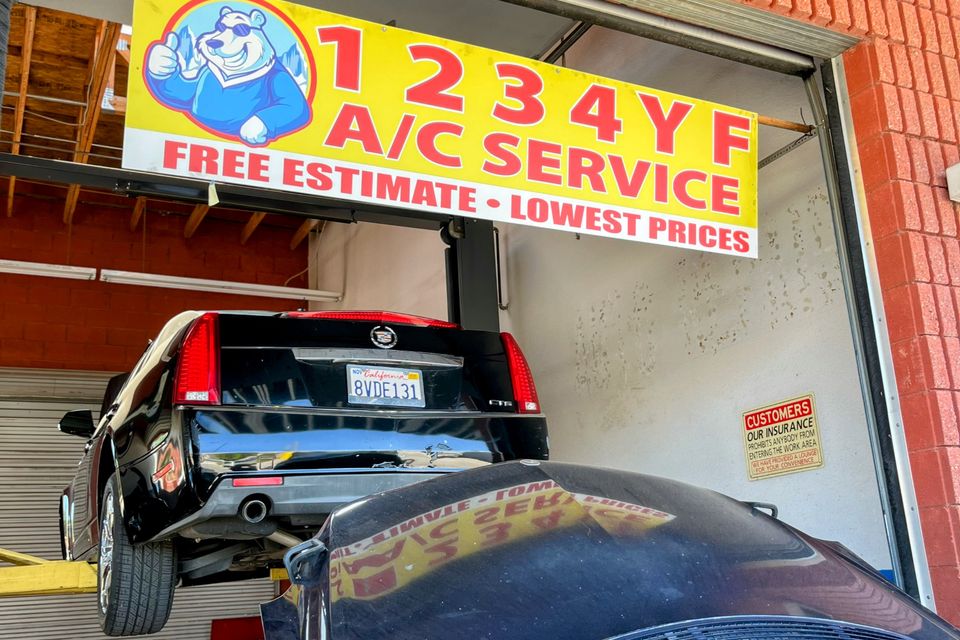Why Your Exhaust System Is Critical to Your Car’s Performance and Safety
A Guide To Your Car's Exhaust System by Johnny’s Radiator and Auto Repair in Victorville
When people think about their car’s engine or performance, they often focus on horsepower, fuel economy, or how smooth it drives. But there's one major system that’s just as important—and it’s often overlooked: the exhaust system.At Johnny’s Radiator and Auto Repair, we've seen how a small exhaust issue can turn into a major problem if it's ignored. From loss of power and fuel economy to dangerous leaks and failed emissions tests, your exhaust system does a lot more than keep things quiet under the hood.
In this post, we’re going to break down why your exhaust matters, how to know when something’s wrong, and what to do if your exhaust system needs attention.
What Does the Exhaust System Do?
Your vehicle’s exhaust system plays several important roles in how your car runs and how safe it is for you and your passengers. The key components include:- Exhaust manifold
- Oxygen sensors
- Catalytic converter
- Muffler
- Resonator
- Exhaust pipes and hangers
1. Direct harmful gases away from the engine and cabin
Burning fuel creates byproducts like carbon monoxide, nitrogen oxides, and hydrocarbons. The exhaust system channels these toxic gases out through the tailpipe, keeping them from leaking into the passenger area.
2. Improve engine performance and efficiency
A properly tuned exhaust system allows gases to flow smoothly out of the engine. This reduces backpressure and helps your engine breathe better—resulting in more power and better fuel economy.
3. Reduce noise
The muffler and resonator work together to dampen engine noise and keep your vehicle running smoothly and quietly.
4. Control emissions
The catalytic converter breaks down harmful pollutants into less dangerous substances before they exit the tailpipe, helping your car meet state and federal emissions requirements.
Why a Failing Exhaust System is a Serious Problem
When your exhaust system is in good shape, you rarely think about it. But when it starts to fail, it can affect nearly every part of your vehicle’s performance.Here’s what can happen if your exhaust system develops a leak or blockage:
1. Decreased Engine Performance
If the exhaust system isn’t letting gases flow efficiently, it can cause your engine to lose power. You may notice sluggish acceleration or poor throttle response.
2. Reduced Fuel Efficiency
Faulty oxygen sensors or a clogged catalytic converter can throw off your air-fuel mixture. When that happens, your car burns more fuel than necessary, costing you more money at the pump.
3. Loud, Uncomfortable Driving Experience
A damaged muffler or disconnected exhaust pipe can make your car sound like a racecar—and not in a good way. The noise can be a nuisance to you, your passengers, and everyone on the road.
4. Increased Emissions and Failed Smog Tests
In California, vehicles must pass strict emissions tests to remain road legal. A damaged catalytic converter or a leaking pipe can cause your car to fail inspection.
5. Risk to Your Health and Safety
If exhaust gases are leaking under the vehicle or near the cabin, there’s a serious risk of carbon monoxide poisoning. Carbon monoxide is odorless and colorless—and in high concentrations, deadly.
Warning Signs Your Exhaust System Needs Attention
Not all exhaust problems come with obvious symptoms, but here are some of the most common red flags to look for:Unusual Noises
- Rattling or clunking from under the car (loose pipes or hangers)
- Hissing or popping sounds (small leaks or cracks)
- Loud roaring or booming (damaged muffler)
- Smell of gas or exhaust inside the cabin
- Rotten egg odor (possible catalytic converter failure)
- Sluggish response when pressing the gas pedal
- Rough idling or stalling
- Often caused by faulty oxygen sensors or emissions problems
- Holes in pipes or muffler
- Broken or hanging exhaust components
- Often the result of an emissions or exhaust malfunction
What Causes Exhaust Problems?
Your exhaust system takes a beating. It’s exposed to high temperatures, road debris, moisture, and chemicals year-round.Common causes of exhaust system failure include:
- Rust and corrosion (especially in older vehicles or those in wet climates)
- Damage from potholes, curbs, or debris
- Worn or cracked gaskets and seals
- Loose or broken hangers
- Failed sensors or clogged catalytic converters
Diagnosing Exhaust Issues at Johnny’s Radiator and Auto Repair
We believe in doing things right the first time. When you bring your vehicle to us for an exhaust concern, we go beyond a quick visual inspection. Here’s what you can expect:1. Full System Inspection
We examine the entire exhaust—from the manifold to the tailpipe—for cracks, leaks, corrosion, missing hardware, or signs of failure.
2. Performance Testing
If your vehicle is experiencing power loss, we check for flow restrictions or backpressure buildup. We also check oxygen sensor performance to ensure correct air-fuel ratios.
3. Emissions Testing
If your check engine light is on or you’ve failed a smog test, we use diagnostic tools to pinpoint sensor failures or catalytic converter problems.
4. Recommendations and Estimates
We’ll explain everything in plain language and help you decide whether a repair or replacement is the most cost-effective, long-term solution.
Common Exhaust Repairs and Services
Depending on the problem, here’s what we might recommend:Muffler Replacement
If your car is louder than usual or the muffler has holes or rust, we’ll install a new one that restores proper sound control.
Catalytic Converter Replacement
A clogged or failing converter will reduce power and cause emissions issues. We install high-quality, legal converters that meet California standards.
Pipe Patching or Replacement
Small cracks or holes may be patchable. Larger sections may need full replacement to ensure safety and durability.
Oxygen Sensor Replacement
We use OEM-grade or better sensors to restore accurate fuel metering and emissions control.
Custom Exhaust Fabrication
Have a specialty vehicle or performance setup? We can fabricate custom pipe sections and muffler configurations to meet your goals.
Can I Drive With an Exhaust Leak?
Technically, you can—but it’s not safe or smart. Here’s why you should get it checked right away:- Leaks can let carbon monoxide enter the cabin
- Engine performance and fuel economy suffer
- Damage can spread to other parts of the exhaust or engine
- You may receive citations for excessive noise or emissions
Should You Upgrade Your Exhaust?
Some customers ask us about upgrading their exhaust system—not just for repairs, but for performance or sound improvements. If you’re interested in improving horsepower or fuel efficiency, we can talk about options like:- Performance mufflers
- High-flow catalytic converters
- Mandrel-bent pipes for smoother airflow
- Dual exhaust setups
How Often Should You Service Your Exhaust?
There’s no set mileage for exhaust service like there is for oil changes, but here are some guidelines:- Have your exhaust inspected every 12 months or 12,000 miles
- Get it checked immediately if you notice unusual sounds, smells, or loss of power
- Replace oxygen sensors every 60,000 to 100,000 miles (depending on vehicle)
- Have your catalytic converter inspected if your check engine light comes on
Why Choose Johnny’s for Exhaust Work?
We’ve been helping drivers in Victorville and the surrounding communities for over four decades. Our team specializes in getting tough jobs done right—without pressure, upselling, or confusion.Here’s why customers trust us:
- Skilled technicians with years of exhaust system experience
- Honest inspections and clear communication
- Quality parts and repairs that last
- Affordable pricing and financing options
- Local reputation built on trust and service
Final Thoughts: Don’t Ignore Your Exhaust System
It’s easy to overlook your exhaust system—until something goes wrong. But like many systems in your car, the earlier you catch a problem, the easier (and cheaper) it is to fix.If your car is louder than normal, smells off, feels underpowered, or just isn’t running like it should, your exhaust might be the reason. And if your check engine light is on, it might be an emissions-related issue that only gets worse over time.
At Johnny’s Radiator and Auto Repair in Victorville, we’ll help you spot the signs, understand your options, and get your vehicle back to peak performance safely and affordably.
Need an Exhaust System Inspection or Repair?
Call or visit Johnny’s Radiator and Auto Repair today. Let’s get you back on the road with confidence.
Johnny’s Radiator and Auto Repair
Serving Victorville, Apple Valley, Hesperia, and the High Desert
Trusted Since 1982 – Honest, Local, Reliable
(760) 241-4253



